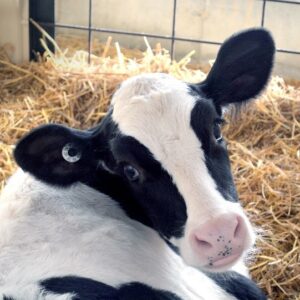Follow your calf’s gut to reap future cow milk production
Eubiotics play a role in growing strong, healthy calves ready to enter the milking herd sooner.
 Want a high-performing, profitable dairy cow? It might be time to pay more attention to your calves’ digestive health. Normal gut health is key to a strong, functioning immune system – which can have lifelong benefits.
Want a high-performing, profitable dairy cow? It might be time to pay more attention to your calves’ digestive health. Normal gut health is key to a strong, functioning immune system – which can have lifelong benefits.
“A calf’s value extends through to her performance as a cow, when she enters the milking herd,” says David Mathes, director of sales and marketing at DBC Ag Products. “One way to maximize this value is to support calf gut health and immunity early in life with eubiotics.”
Learn how maintaining digestive calf health can pay back in long-term value:
Digestive health’s role
About 70% of a calf’s immune system resides in or around the gastrointestinal (GI) tract. Environmental changes, antibiotics and other causes can alter normal gut flora. If the calf digestive system is not working well, it can impact nutrient absorption and immune system function.
“Maintaining normal gut flora and a healthy digestive system plays an all-important role in dairy calf health,” says Mathes. “It also supports the immune system so it can perform its job of helping produce healthy, fast-growing calves.”
Maintaining digestive health also pays dividends in dairy cows. Research shows proper health management and optimal nutrition during the first 6-8 weeks of life can impact future performance.
One study showed for every 2.2 pounds of average daily gain prior to weaning, milk yield increased by 5,023 pounds over three lactations. Growth rate and nutrient intake before weaning had a more direct and significant effect on milk yield than genetic selection for production.[1]
Feeding dairy calves eubiotics supports digestive health and immune function early in life and yields more return later in milking performance.
How eubiotics work
Eubiotics are often described as a class of ingredients including probiotics, prebiotics, essential oils and organic acids. They are normally available for adding to milk or milk replacer and paste for individual administration. Each ingredient has a specific, valuable function for your calves, but the real benefit comes from these ingredients working together.
Ingredients in eubiotics include:
- Probiotics deliver viable microorganisms to help maintain a natural population balance of probiotic microorganisms in the GI tract and support digestive health.
- Prebiotics provide a food source for naturally occurring microorganisms in the gut to help maintain proper flora and support digestion.
- Organic acids help provide nutritional support for the digestive tract mucosal lining for a healthy, active GI tract microbiome.
- Essential oils offer flavoring for appetite, while supporting gut health and digestive function.
“Eubiotics combine a multitude of beneficial ingredients which work synergistically together to maintain dairy calf gut health and support the protective layers of the GI tract,” says Mathes.
Other less traditional novel feed ingredients like egg proteins, specialized whey proteins, dried kelp, yucca schidigera and psyllium seed husk have shown to support a healthy gut.
“Eubiotics, combined with other novel feed ingredients which support gut health, present a total package to support dairy calf health,” says Mathes. “Supporting dairy calf health is a proactive way to obtain a high-performing cow that pays you back in the bulk tank.”
Look for a total package containing multiple eubiotics to deliver the broadest level of calf support.
“Feeding dairy calves a broad range of eubiotics can support the GI tract and immune system, supporting overall health,” says Mathes. “And it can pay off in faster growth, resulting in cows that enter the milking herd sooner and produce more milk.”
Learn more about First Arrival®, a total eubiotics package.
[1] VanAmburgh ME, Soberon F, Raffrenato E, Everett RW. 2012. Preweaning milk replacer intake and effects on long-term productivity of dairy calves. Cornell University.
